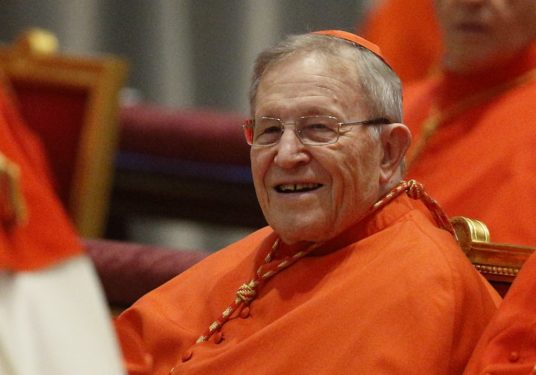By Christopher White, The Tablet’s National Correspondent

ROME – As one of the major protagonists of the Francis papacy – and arguably of the Catholic Church since Vatican II – German Cardinal Walter Kasper argues, “there is no real substantial difference between Pope Benedict and Pope Francis.”
“They are different personalities of course, different backgrounds,” said Cardinal Kasper. “One is European, the other comes from Latin America. [But] if you read exactly what they write, it’s the same line and substance.”
Cardinal Kasper’s comments came in an interview with The Tablet following an award ceremony in which he received the “Civitas Dei” medal from Villanova University on Thursday.
The former head of the Pontifical Council for Promoting Christian Unity was presented the award by Dr. Barbara Wall, vice president for Mission and Ministry at Villanova.
He’s the seventh awardee to receive the honor, which is bestowed “to Catholics who, through their work, have made exemplary contributions to the Catholic intellectual tradition and especially to the pursuit of truth, beauty and goodness,” drawing its inspiration from Saint Augustine’s landmark work The City of God (De Civitate Dei).
Cardinal Kasper, who headed the Vatican office for Christian Unity from 2001 to 2010, was feted, in the words of Villanova professor Massimo Faggioli, as an “outstanding example of the ethos of a Catholic theologian, as an academic and a man of the Church,” and lauded by Suzanne Wentzel, director of research and publications at Villanova, as a theologian who “pulls the faithful back from the brink,” preaching strictly the good news be it “left, right, or straight up the middle.”
He used his acceptance speech to highlight the legacy of Augustine, whom he dubbed an “intellectual master of Europe,” for his work in promoting “peace by justice.”
At the heart of Augustine’s teaching, Kasper insisted, is the belief that peace cannot be possible without religious foundations.
“We need this especially in our own secularized societies,” he continued, arguing that the same divide that Augustine explored in his classic work – between love of God and love of self – underlies today’s present dangers in countries that are too self-referential, leading to nationalist impulses.
The German cardinal, who’s now 85, added that he knew this firsthand from his own experience growing up in Germany, where “nationalism led to the second world war.”
Overcoming this self-love, be it individualistic or nationalistic, he contended, is essential for both peace and justice, and must be found in God.
“Respect for God is a foundation for respect for the other and for creation,” he said.
Thursday’s event took place in the middle of the Vatican’s month-long Synod of Bishops on “Young People, the Faith, and Vocational Discernment.”
Cardinal Kasper became a leading figure during the 2014 and 2015 Synods on the Family, and is widely viewed as the architect of the final document’s cautious opening to communion for divorced and remarried Catholics.
Pope Francis publicly praised his book, Mercy, in which he first outlined the proposal, soon after his election in 2013.
Cardinal Kasper told The Tablet that he was happy to be on the sidelines of the current synod, while lamenting that certain controversies from the previous two synods have overshadowed both his and the pope’s intent.
“I think mercy doesn’t mean you give up everything. It’s not against justice. Mercy is for justice, the Christian form of justice of God, which forgives us and makes us just,” he held. “I do not understand all the problems they have with it.”
Five years after Francis first praised Cardinal Kasper, he is returning the favor, saying Francis has taught the world a new way of being pope.
“This cannot be any longer a European Church or a Western Church,” Cardinal Kasper said, “but a Church for the whole world.”
“There is no one way to be a pope,” he maintained. “The Petrine office has had many changes during history.”
“I am very much in favor of this pope,” he added.
As for his hopes for this current synod, he believes the best outcome is a Church that is better prepared to listen to young people to better understand them.
“The important thing is to listen to the younger generation of young people,” he told The Tablet. “We cannot agree with everything, it’s not possible, but we have to listen to their desires.”
While his speech drew on Augustine, he pointed to another popular saint when speaking about the Church’s response to young people.
“Saint Benedict, in his rule, said the abbot has to listen to the youngest of monks,” he recalled. “It’s a reminder that the Holy Spirit can speak to all of the Church.”Thursday’s event took place in the middle of the Vatican’s month-long Synod of Bishops on “Young People, the Faith, and Vocational Discernment.”
